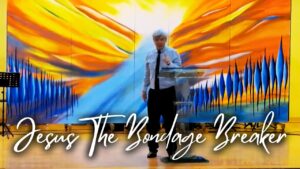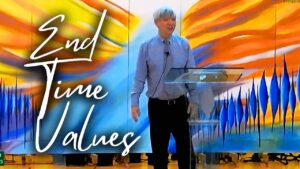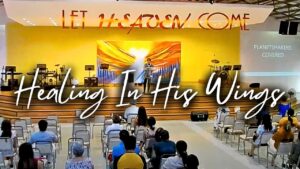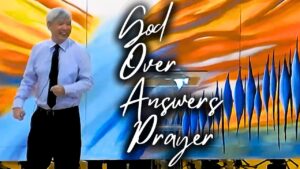KEY TEXT
1 Samuel 27:1-6 (NKJV)
V1- And David said in his heart, “Now I shall perish someday by the hand of Saul. There is nothing better for me than that I should speedily escape to the land of the Philistines; and Saul will despair of me, to seek me anymore in any part of Isarel. So I shall escape out of his hand.
V2 – Then David arose and went over with the six hundred men who were with him to Achish the son of Maoch, king of Gath.
V3- So David dwelt with Achish at Gath, he and his men, each man with his household, and David with his two wives, Ahinoam the Jezreelitess, and Abigail the Carmelitess, Nabal’s widow.
V4- And it was told Saul that David had fled to Gath; so he sought him no more.
V5- Then David said to Achish, “If I have now found favor in your eyes, let them give me a place in some town in the country, that I may dwell there. For why should your servant dwell in the royal city with you?”
V6- So Achish gave him Ziklag. Therefore Ziklag has belonged to the kings of Judah to this day.
2 Samuel 15:23 (NJKV) – And all the country wept with a loud voice, and all the people crossed over. The king [David] himself also crossed over the Brook Kidron, and all the people crossed over toward the way of the wilderness.
1 Kings 17:3 (NKJV)- “Get away from here and turn eastward, and hide by the Brook of Cherith, which flows into the Jordan.”
INTRODUCTION
- Special places in any journey
- Title
“ZIKLAG, KIDRON AND CHERITH – THE THREE SPIRITUAL PLACES IN OUR LIFE’S JOURNEY”
Outline:
- ZIKLAG – Its background, meaning and applications
- KIDRON – Its background, meaning and applications
- CHERITH – Its background, meaning and applications
- Jesus and these three spiritual places
MAIN POINTS
I. ZIKLAG
ITS BACKGROUND
Ziklag was located in the Negev region in the south-west of what was the kingdom of Judah.
1 Samuel 27:1 -And David said in his heart, “Now I shall perish someday by the hand of Saul. There is nothing better for me than that I should speedily escape to the land of the Philistines; and Saul will despair of me, to seek me anymore in any part of Israel. So I shall escape out of his hand.
The background story of Ziklag and David?
“Philistine” =“is to wear down, to roll or wallow in self (pity)”.
Application: Have we not all at one time or another been victims and sojourners in “the land of the Philistines”? We face situations with our health, financial issues, sins that plague us, temptations, struggles with relationships, and many other circumstances whereby we are under assault often for years without any remedy in sight. Consciously or subconsciously we give in to a life of defeat and despair of ever knowing victory in a particular situation.
When Saul heard that David had moved into the land of the Philistines, he no longer pursued him.
Application: So, it is with the enemy of our souls. A defeated and hopeless Christian is no longer a threat to Satan’s dominion for we are dwelling in the place of his rule.
“And it was told Saul that David had fled to Gath; so he sought him no more.” (1 Samuel 27:4)
David asked the King of the Philistines to appoint a place for him to dwell!
Then David said to Achish, “If I have now found favor in your eyes, let them give me a place in some town in the country, that I may dwell there. For why should your servant dwell in the royal city with you?” (1 Samuel 27:5)
To which the King of the Philistines was more than pleased to give unto David Ziklag.
“So Achish gave him Ziklag. Therefore Ziklag has belonged to the kings of Judah to this day.” (1 Samuel 27:6)
ITS MEANING
Ziklag comes from a Hebrew root verb meaning to “press (mentally) someone or something to reveal what is inside”
Scholars have identified two separate roots of the form צוקiti.
1: The verb צוק (suq I) denotes pressing someone (mentally) in order to bring out what’s kept inside.
E.g. # 1 –The enemies press the cities they besieged to surrender (Deuteronomy 28:53-57, Isaiah 51:13, Jeremiah 19:9).
E.g. # 2 – The Timnites pressed Samson for the answer to his riddle (Judges 14:17)
E.g. # 3 – Delilah pressed for the secret of his strength (16:16).
2: The verb צוק (suq II) also denotes the bringing forth of something contained internally, which is done either by applying pressure or by smelting.
E.g. # 1 – From rock, copper is smelted (Job 28:2)
E.g. # 2 – Rocks poured/squeeze out streams of oil (Job 29:6).
E.g. # 3 –Isaiah observes that in their distress, the people of Israel visited YHWH and poured/squeezed out a whisper (Isaiah 26:16).
Ziklag is a place where we are pressed, shaped of God.
In summary, ZIKLAG MEANS THE PLACE OF THE GREAT PRESS OF GOD.
ITS APPLICATIONS
Ziklag ……
- is a spiritual place we must visit in our walk with God.
- is a place wherein we find ourselves when the press is on, the situation is dire and we, at that moment, revert to our own devices and seek out a refuge from the storm apart from God.
- It is a necessary work of God to reveal to us our HIDDEN RELIANCE on other things rather than Him alone.
It is here that David is pressed even further.
The attack and raid of the Amalekites on Ziklag.
“Now it happened when David and his men came to Ziklag, on the third day, that the Amalekites had invaded the South and Ziklag, attacked Ziklag and burned it with fire, and had taken captive the women and those who were there, from small to great; they did not kill anyone, but carried them away and went their way.” (1 Samuel 30:1-2)
This last compounding of the trial had brought David’s men and David to a place of inconsolable grief.
“Then David and his men came to the city, and there it was, burned with fire; and their wives, their sons and their daughters had been taken captive.” (1 Samuel 30:4)
In the midst of this great sorrow we read even David’s men began to speak of stoning him!
“Now David was greatly distressed, for the people spoke of stoning him, because the soul of all the people was grieved, every man for his sons and his daughters. But David strengthened himself in the LORD his God.” (1 Samuel 30:6)
The great pressing of God had come to David.
The energies and strategies of all his natural ability had been thrown into the press of the Almighty God.
The despair, discouragement, and enormity of circumstance had been brought to bear upon David.
What would become of him?
But David strengthened [KJV – “encouraged”] himself in the LORD his God.” (1 Samuel 30:6)
“So David recovered all that the Amalekites had carried away, and David rescued his two wives, And nothing of theirs was lacking, either small or great, sons or daughters, spoil or anything which they had taken from them; David recovered all.” (1 Samuel 30:18-19)
The end of man brings us to the beginning of God and His resources.
“Man’s extremity is God’s opportunity.”
Though the press seems more than one can bear, God knows our frame and His ways are higher than ours.
Men who are called of God to walk in the high places must know of these pressings and the ways of the Most High God.
In the Old Testament, men were born priests.
In the New Covenant we are “…made kings and priests unto God and his Father” (Revelation 1:6).
God’s end in our lives is to be made like unto Him to such an extent that “…as he is, so are we in this world”. (1 John 4:17)
Now David could declare…
“Oh, bless our God, you peoples! And make the voice of His praise to be heard, Who keeps our soul among the living, And does not allow our feet to be moved. For You, O God, have tested us; You have refined us as silver is refined. You brought us into the net; You laid affliction on our backs. You have caused men to ride over our heads; We went through fire and through water; But You brought us out to rich FULFILLMENT [KJV – wealthy place; RSV – a spacious place].” (Psalm 66:8-12)
Note that Ziklag was originally a city of Philistine rule.
As a result of David being brought low, and then rising up in the strength of his God, Ziklag became a possession of Israel!
Application: That which was meant by the enemy to destroy David became part of the inheritance of Israel. God’s intention is to bring us to the place of victory in Christ Jesus.
“Therefore Ziklag has belonged to the kings of Judah to this day.” (1 Samuel 27:6)
It is God’s plan and desires that all the things that are meant to crush us become a place of victory and praise unto our God.
It is in these places that the overcomers in God arise and stand in the strength and faithfulness of our Lord Jesus Christ.
“He gives power to the weak, And to those who have no might He increases strength.” (Isaiah 40:29)
Application: Are you in this place called Ziklag, where you feel God, people and life are pressing very hard on you to the point you are discouraged and in distress?
II. KIDRON
2 Samuel 15:23 (NJKV) – And all the country wept with a loud voice, and all the people crossed over. The king [David] himself also crossed over the Brook Kidron, and all the people crossed over toward the way of the wilderness.
ITS BACKGROUND
The Kidron Valley is a place just outside of Jerusalem, in between the city and the Mount of Olives.
The name Kidron (or Cedron in the KJV) is either a reference to the “darkness” or “murkiness” of the water that periodically flows in that place or to the cedars that grow in that area.
The Kidron Valley is technically a wadi, as a stream runs through it only after heavy rains.
The background story of David and the Brook Kidron.
ITS MEANING
Kidron in Hebrew means darkness, turbulence, great agitation, and great evil.
Kidron = Very Black, Full of Darkness.
The Brook Kidron is mentioned as the extent of Shimei’s confinement, the one who cursed David in this dark place of betrayal.
How fitting was his judgment that when he crossed the Kidron, Solomon had him executed (1 Kings 2:36-46)!
In summary, THE BROOK KIDRON REPRESENTS THE DARK PLACE OF BETRAYAL
ITS APPLICATIONS
It was a brook that flowed into the Dead Sea.
It is a brook that must be crossed over, where the deep lessons of God’s faithfulness, His steadfastness, and His mercy become the very core of our hope.
It is here we are weaned from dependence upon others and God Himself becomes our friend and salvation.
Kidron represents the shattering of our self-reliance and strength, our allegiance to other things.
It is the doorway into a new wilderness experience that is quite different from the others in which we have walked.
New testing and new sorrows must bring us into new places of faith and reliance upon God.
The processing of our God is thorough and effectual.
What others mean for evil God makes for our good.
The trial known here is more painful and heart-rending as it is not one which comes to us from foes without but from friends within the family of God. Later on, in the Psalms David speaks of these deep and agonizing experiences in Psalm 55:12-14:
The Brook Kidron is one of the most important crucibles we will face in our lives.
The enemy of our soul has orchestrated it for our destruction; God allows it for our good.
The great danger with any bitter experience is that we allow it to linger and fester.
This incapacitates us from living and blossoming in the goodness of God.
E.g. The three Hebrew men thrown into the fire
God’s design is for us to walk through this excruciating experience with no hint of bitterness remaining.
God’s determination for the painful lessons of the Brook Kidron is for us to become sweet.
Do not fear when these waters arise and would drive you into the wilderness, for God, even thy God shall prove thee and work in thee the wonder and the sweetness of Jesus Himself…
“Who is this coming out of the wilderness Like pillars of smoke, Perfumed with myrrh and frankincense, With all the merchant’s fragrant powders?” (Song of Solomon 3:6)
The good news is we will never cross this brook alone.
“He (Jesus) went out with His disciples over the Brook Kidron…” (John 18:1)
Application: Have you been betrayed by your friends, spouse, children, colleagues or even church leaders?
III. CHERITH
1 Kings 17:3 (NKJV)- “Get away from here and turn eastward, and hide by the Brook of Cherith, which flows into the Jordan.”
ITS BACKGROUND
Background story of Elijah and Brook Cherith in1 Kings 17
Brook Cherith is described as being “before,” that is “east” of Jordan. It is probably the present wadi Kelt, west of Jericho.
ITS MEANING
The true path of the Lord will always culminate in the setting apart of a vessel unto Himself.
“Cherith” literally means separation, derived from a Hebrew root meaning to “cut off”.
In summary, CHERITH IS THE PLACE OF SEPARATION.
ITS APPLICATIONS
This life of separation is not the result of works of the flesh or caused by carnal means.
It is always entered into by the simple obedience of an individual unto the Word of the Lord.
As such, this place of separation will always be filled with special provisions of God to sustain one in the center of His Will.
“And it will be that you shall drink from the brook, and I have commanded the ravens to feed you there.” (1 Kings 17:4)
In these times of loneliness and separation, God Himself comes in new and profound ways.
There is a drawing near, a learning and a dependency upon Him and His provisions; a time of being hid in the wonder of God Himself.
This place of separation brings one to new places of freedom from other comforts and even our reliance on friendships for in the presence of God there is room for none other than God Himself.
“And it happened after a while that the brook dried up, because there had been no rain in the land.” (1 Kings 17:7)
These separations are intended by God to be temporary in the life of His own, not permanent dwelling places, for God’s desire is that the vessel be poured into the lives of others.
The special provision of God dries up and the Word of the Lord comes to move on in new power and a closer relationship with Him.
The vessel is prepared for greater works by the cutting off of former things.
On this occasion, there was a widow in need of the touch of the Lord who would also be a source of new sustenance.
“Then the word of the LORD came to him, saying, “Arise, go to Zarephath, which belongs to Sidon, and dwell there. See I have commanded a widow there to provide for you.” (1 Kings 17:8-9)
E.g. Paul (Galatians 1:15-18)
To what end was the separation of Paul?
“To reveal His Son in me…” (Galatians 1:16)
IV. JESUS AND THESE THREE SPIRITUAL PLACES
In 2 Samuel 15:23, we see David crossing the Brook Kidron because of the betrayal of his son, Absalom.
Over a thousand years later we see Jesus crossing this same dark brook as He also was being betrayed: by Judas.
“He (Jesus) went out with His disciples over the Brook Kidron…” (John 18:1)
The final drama of Jesus’ life was unfolding. Judas had gone to the religious leaders of that day and obtained a “band of men” to come and take Jesus by force unto the Chief priests.(John 18:1-3)
It is important to note that not only did Jesus cross over this dark and turbulent brook but so did His disciples.
Think it not strange that the servant is to follow in the same path as the Master.
It is in following Him that we become molded and shaped by the experiences of life to overcome as He overcame; to find the healing and sweetness of His life rising in our own.
It is the bitter experiences that free us from our own bitterness.
When Jesus was nailed on the cross, THE CROSS BECAME THE CONFLUENCE OF THESE THREE SPIRITUAL PLACES: ZIKLAG, KIDRON AND CHERITH.
On the cross, Jesus had His Ziklag experience – he was pressed by the crown of thorns on his head; his lungs were pressed for more breath because of the crucifixion. He was so pressed by the physical torture of crucifixion till His life was pressed out of Him.
On the cross, Jesus also had His Kidron experience. Not only His own disciple, Judas, betrayed him; His beloved inner circle, Peter, denied him three times; all the rest of the disciples forsook him when he was arrested; the people who sang “Hosana” to Him a week before, was the same people who shouted, “Crucify Him, Crucify Him!” There on the cross, He tasted the bitterness of betrayal. The vinegar the guard gave him while he was hung on the cross was a symbol of the bitterness He was feeling.
Cherith came to play when finally, Jesus was separated from God His father. God hid His face from Jesus while He atoned for our sins on the cross.
Talking about great pressing, betrayal and separation – Jesus went through this sevenfold on the cross so that today when any one of us is in this place called….
- Ziklag – where we are pressed by God, by people and by life, He would expose our wrong idols. He would press out all the sins and impurities in our heart and then He would personally come in through the power of the Holy Spirit to help us to pursue, overtake and recover whatever the “Amalekites” have raided us of.
- Kidron – Experiencing all the pain of betrayal at different levels and at different points of our lives, we can find the healing and sweetness of His life rising in our own, because in the midst of His broken heart by betrayal, He still shouted out, “Father, forgive them for they know not what they are doing.” The bitter experiences of Jesus freedHim from His own bitterness so that today, when you are betrayed, He could give you the sweetness of His own forgiveness so that you can forgive those who have betrayed you.
- Cherith – where it seems God is “cutting off” so many things familiar to us, even at times it seems God is “hiding” us away from the world – we can be assured of God’s faithful provision and full revelation of Himself to us. He is separating us unto Himself so we can receive full revelation of Him as well as to prepare us for another realm of ministry.
What is the HEART ISSUE that God is working in us by leading us to these three spiritual places?
WRONG RELIANCE
Ziklag – self-reliance
God uses Ziklag as the pressing out of this self-reliance
Kidron – reliance on others
God uses Kidron as the shattering of our allegiance to other things.
Cherith – reliance on the familiar
God uses Cherith as the cutting off of the familiar and developing new faith in God’s provision and leading.
CONCLUSION
You will not realize that Jesus is all you need until Jesus is all you have left.
God will lead you to these three spiritual places to wean off in your life where your motto is:
JESUS + SOMETHING/SOMEONE
He tries to press out from your life, shatter your life and cut off from your life using these three spiritual places till what you are left with is:
JESUS ONLY
My Testimony
“We are hard pressed on every side, but not crushed; perplexed, but not in despair; persecuted, but not abandoned; struck down, but not destroyed. We always carry around in our body the death of Jesus, so that the life of Jesus may also be revealed in our body. For we who are alive are always being given over to death for Jesus’ sake, so that his life may also be revealed in our mortal body. So then, death is at work in us, but life is at work in you.” (2 Corinthians 4:8-12)
end





